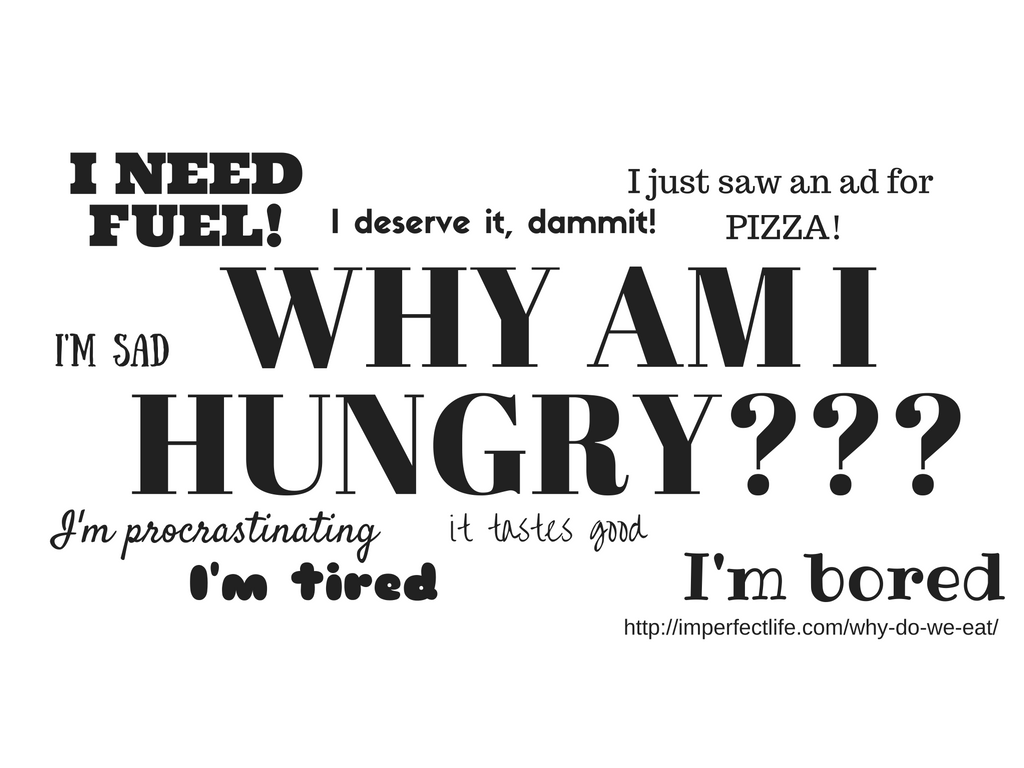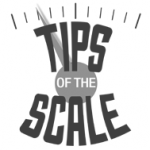WHY WE EAT- Types of Hunger
Understanding the difference between true physical hunger, the not-so-true head-hunger, and all those mad cravings we sometimes get, is vital to making food (fuel) choices that benefit our mind, body and soul in order to live our best, happy, healthy, I’mperfect Life!
In this post I will teach you how to identify the difference and what to do when you experience the three most common reasons for eating food.
First of all, it’s important to understand that eating food is not a bad thing, even those that aren’t exactly beaming with nutritional value. All food is fuel, whether it’s used (burned) immediately for energy, or stored as fat to be used for energy later, your body needs fuel, and you need to eat. Period.
For those of us who struggle with our weight, the main culprit tends to be WHY we eat. Of course what we eat and how much we eat are very important too, but those issues are much simpler to solve once we tackle the issue of WHY.
People eat for three main reasons:
- We are actually hungry
- We convince ourselves we’re hungry, also known as “head hunger” usually out of boredom, habit, or an emotional response
- Something triggers a craving
Now there’s also a fourth reason– eating disorders such as Binge Eating Disorder (BED) or the extreme and very rare: Prader-Willi Syndrome. These topics are out of my scope and should be treated by a healthcare professional.
 How to identify the difference between the 3 main reasons we eat
How to identify the difference between the 3 main reasons we eat
The only way to know the difference between real hunger, head hunger, and a craving is to stop and think about what you want and why you want it.
True Physical Hunger
- It will have been at least a couple of hours since you last ate, or there will have been some significant, vigorous activity since your last meal.
- Your stomach will be growling and feel uncomfortable.
- You might feel a little weak.
- Your brain will be foggy, and the apple sitting on counter will call to you.
- You’re not bored, tired, avoiding a task (procrastinating) or simply thinking, seeing, smelling, or talking about something that is delicious.
If all or most of these are true, then you’re experiencing true hunger. You will eat that apple and feel satisfied. It may not fill you up, but it will be enough to satiate you for a while until you’re able to eat an actual meal.
If all or most of these are true and all you can think is, “Oh my gawd! I need to eat some food! Where can I find some food? Any food will do! I NEED FOOD!” Then you’re probably too hungry and should have eaten sooner.
Allowing yourself to get too hungry can put you and your body in panic mode, making you believe that you need foods that are high in sugar and fat– this is not a lack of willpower. Wanting sugar and fat when we’re too hungry is the body’s natural response to needing quick and lasting fuel because the body is super efficient at using sugar for energy and storing fat as fat for future use.
Staying in control of your hunger level is key to making food choices that allow you to feel good: physically, mentally and emotionally.
Head Hunger
- Head hunger is just that. It’s hunger that is coming from your brain rather than your body.
- Head hunger occurs shortly after a meal, or at least not far enough after to actually NEED food, and you’ll know it.
- When you’re bored
- When you’re overly tired
- When you’re avoiding a task you really don’t want to do.
- Out of habit– dessert, the afternoon trip to the vending machine, the morning stop at Starbucks
- You might even find yourself saying, “I know I shouldn’t be hungry right but good gawd I want (you might even say ‘need’) ______ right now!”
Head hunger can be hard to manage because our brains can convince our bodies to “feel” what we think is true hunger. We might even get some hunger pangs or a feeling of panic that tells us we must eat, especially if we’re stressed or feeling anxious about something. In those cases the best thing to do is get up, walk away, and focus on breathing.
In those moments the body doesn’t actually need food, it needs comfort. Comfort comes from knowing that we’re okay. The number requirement for the body to survive is oxygen, so give it what it really wants (NEEDS) and breathe.
Cravings
Cravings can be tricky, as some are real and some are really just head hunger. It all depends on what’s triggering them. A craving brought on by true physical hunger or a nutrient deficiency is our body’s way of telling us exactly what it needs, be it fuel or specific vitamins and minerals. Typically, if you’re craving meat, or a fruit or vegetable, you’re experiencing a true physical craving and your body is telling you, “I need _____!”
However, cravings are most often caused by other stimuli such as seeing something that looks good, smelling something that looks good or even just thinking or talking about something that is good.
Example: An argument over which is better, New York or Chicago style pizza can instantly make you crave pizza.
When this happens it’s up to you to decide how to handle it. Cravings can become overwhelming and create the ugliest kind of head hunger– I NEED TO EAT ALL OF THE PIZZA RIGHT NOW! Or they can subside. It all depends on how you manage them.
I find that acknowledging the craving, telling myself that I can have ____ whenever I want, without stipulations, is the best way to deal with it. For instance, in the example given above, I’d say to my friend, “Ooh! We should go for pizza on Friday for lunch!” Then, if we do, great, if we don’t eh, I’m sure I’ll have it soon anyway.
Cravings are often made worse by denying them. Cravings are normal and they are okay. Having them isn’t bad and indulging them doesn’t equal failure.
Be honest with yourself. Listen to your body. And never beat yourself up if you make a choice or decision that wasn’t best for your lifestyle goals. Just acknowledge it, ask yourself what you can do differently in the future, commit that to memory, and move on.
Eat foods that make you feel good– physically, mentally and emotionally. Always. And remember that sometimes that is a piece of chocolate cake, and that’s okay!
Love yourself for who and what you are right now, and get excited about where you’re going!
There’s lots more I could say on this topic, but that will have to wait for another post. <3
PRESS HIGHLIGHTS






